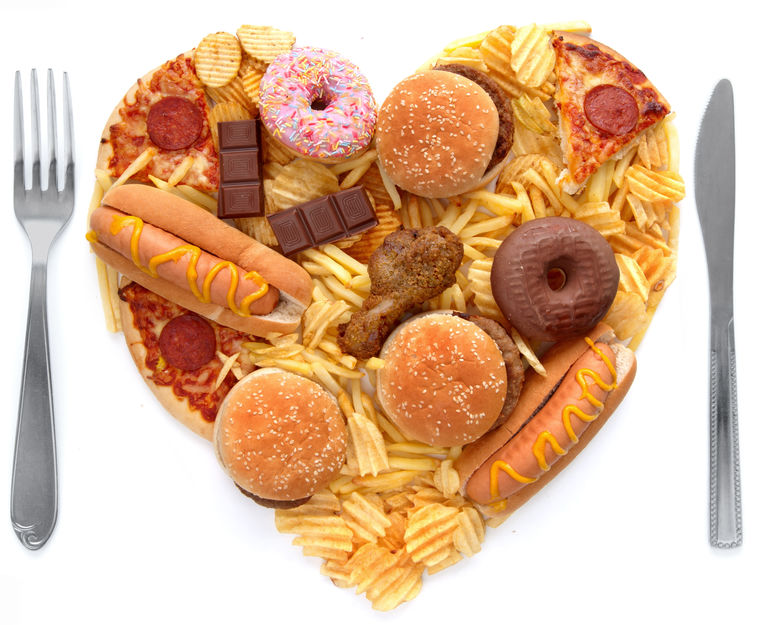Unhealthy diets rely heavily on processed foods. They also lead to weight gain.
In the first study of its kind, scientists have shown that eating ultra-processed foods leads to weight gain in human volunteers in as little as 2 weeks.
Research studies have reported associations between processed foods and health conditions such as an increased risk of developing obesity, cancer, autoimmune conditions, and even death.
Unhealthy Diets are the Norm in the US
Unhealthy diets are not the exception in the US, but the prevalent pattern. In fact, ultra-processed foods make up 57.9% of energy intake in the United States.
According to the NOVA food classification system, ultra-processed foods include soft drinks, packaged snacks, meat nuggets, frozen meals, and foods high in additives and low in unprocessed ingredients.
New Study on the Effects of Unhealthy Diets
Kevin D. Hall, from the National Institute of Diabetes and Digestive and Kidney Diseases, conducted this study of unhealthy diets. Hall and his colleagues conducted a controlled clinical trial, comparing the effects of unprocessed versus ultra-processed foods on humans. The study is reported in the journal Cell Metabolism.
How the Study Was Conducted
This was the study protocol:
- The research team recruited 10 male and 10 female volunteers who stayed at the NIH Clinical Center for 28 days.
- Half of the participants ate ultra-processed food for the first 2 weeks while the others received unprocessed foods.
- After the 2-week period, the groups switched, allowing each participant to eat both the ultra-processed food and the unprocessed food for 2 weeks.
- The volunteers ate three meals per day, and the researchers asked them to eat as much or as little as they wanted. They also had access to snacks and bottled water all day.
Study Results
These were the study results:
- Participants in the unprocessed food group lost an average of 2 lbs. during the 2 week study period. This group also saw increases in the gut hormone peptide YY, which suppresses hunger, and decreases in the hunger hormone ghrelin.
- On the other hand, when the participants were on the ultra-processed diet, they ate an average of 508 calories more each day than when they were on the unprocessed diet.
- As a result, eating ultra-processed foods caused the study subjects to gain an average of 2 pounds during this time, mostly in the form of body fat.
Researchers Were Surprised by the Study Results
Hall says that “We hypothesized that ultra-processed foods might lead to increased calorie intake because they are often high in sugar, fat, and salt while being low in fiber. Therefore, when we matched the ultra-processed and unprocessed diets for these nutrients, we expected the ultra-processed diet to result in similar calorie intake and little differences in body weight.”
The results surprised Hall: “I was surprised by the findings from this study because I thought that if we matched the two diets for components like sugars, fat, carbohydrates, protein, and sodium, there wouldn’t be anything magical about the ultra-processed food that would cause people to eat more.”
Why Do We Eat More on Ultra-processed Diets?
- There are several reasons that Hall and his colleagues think may have led the volunteers in the ultra-processed study group to put on weight. Although the study participants rated the pleasantness and familiarity of the diets as equal, they ate significantly faster in the ultra-processed group. In fact, they consumed an extra 17 calories, or 7.4 grams of food per minute, than their counterparts in the unprocessed food group.
“There may be something about the textural or sensory properties of the food that made them eat more quickly,” Hall comments. “If you’re eating very quickly, perhaps you’re not giving your gastrointestinal tract enough time to signal to your brain that you’re full. When this happens, you might easily overeat.”
- Despite a close match in the macronutrient composition of both diets, the unprocessed diet contained slightly more protein. “It could be that people ate more because they were trying to reach certain protein targets,” Hall comments.
Yet the team found that the ultra-processed food group actually consumed more carbohydrates and fat than the unprocessed food group, but not protein.
Finally, the meals in the ultra-processed group had a higher energy density than in the unprocessed group, which Hall proposes “likely contributed to the observed excess energy intake.”
Click here to read full article about unhealthy diets and weight gain.






